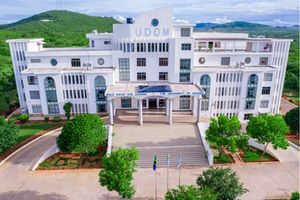Tanzanian businesses optimistic over DRC entry into EAC

What you need to know:
- The 2.3 million square kilometre km country currently has a human population nearing 100 million people and its admission will increase the total Gross Domestic Product (GDP) of EAC bloc by $50 billion.
Arusha. Tanzanian firms have expressed optimism towards the proposed entry of the Democratic Republic of Congo (DRC) into the East African Community, saying the country will provide huge consumer market.
This follows Wednesday’s approval to admit the vast country in the heart of Africa into the East African Community (EAC).
“We are assured of a big market for the foodstuffs and construction materials,”, said Mr Walter Maeda, the chairman of the Arusha regional business chamber.
Kenya, whose firms have lately increased their presence there, will benefit from the export of its manufactured goods.
Tanzania has to exploit the land-locked country’s direct route to the sea through the central corridor, Mr Maeda suggested.
Mr Josephat Rweyemamu, the chairman of the East African Confederation of Informal Sector Organiszations, said DRC entry would boost trade in the region.
“DR Congo has a huge population,”, he told The Citizen on phone from Dar es Salaam, calling on traders to be more aggressive in the export of foodstuffs.
As optimism reigned on the proposed admission of a new member to the expanding bloc, an analyst has expressed fears on the likelihood of EAC losing its identity.
Mr Richard Masandika, the coordinator of Mwiwa-Arusha, an association of agriculture entrepreneurs, gave the caution yesterday.
“Continued expansion means in the long run this will necessitate the change of name of the bloc instead of EAC,”, he said.
He added that the likely entry of the resource-rich DRC into the Community has come at a time EAC is still grappling with a host of challenges.
“The challenges facing the bloc like budget constraints have not been fully tackled,”, he said, noting the huge size of the country means increased costs of travel.
However, the East African Business Council (EABC), an apex body of private sector associations, said that a free trade area between DRC and EAC was most welcome.
The regional business body based in Arusha suggested that the East African private sector should be “in the centre of the negotiations for DRC entry”.
DR Congo admission, insisted John Bosco Kalisa, EABC executive director, “presents enormous opportunities in terms of enhanced market opportunities”.
Moses Allan, the President of the Arusha-based lobby called Friends of East Africa, said DRC offers a bigger single market than elsewhere in the region.
Although the giant country’s admission would necessitate making French another EAC official language, Kiswahili is alsowidely spoken there.
Should the admission be formaliszed, DR Congo would overtake Tanzania as the largest country in the region in land area and human population.
The 2.3 million square kilometre km country currently has a human population nearing 100 million people and its admission will increase the total Gross Domestic Product (GDP) of EAC bloc by $50 billion.
EAC’s total GDP currently stands at $193 billion and with DRC joining it will shoot up to $ 240 billion, a huge economy indeed.
A Dar es Salaam resident Emmanuel Ghawoga admitted he was not comfortable to hear DRC R Congo joining the EAC bloc because of persistent conflicts there.
“There is no peace and security there unless the planned admission is aimed to resolve those conflicts (in eastern Congo),”, he said.
Wednesday’s virtual summit, nevertheless, assured that matters pertaining to peace and security would be factored in the negotiations that would commence soon.
The others are issues pertaining to language and the legal systems. The country uses French as an official language unlike English in the EAC.
DRC, the largest country in sub-Saharan Africa in land area, has untapped deposits of raw minerals estimated to be worth in excess of $24 billion.
It also has 70 percent of the world’s coltain, a third of its cobalt among a range of high value minerals found there.
A study conducted by EABC in 2019r indicated that the EAC bloc’s exports to the DRC for 2018 stood at $855.4 million.
DRC, nevertheless, remains much dependent on the Tanzanian route to the sea, with Dar es Salaam port handling the bulk of its imports and exports.




